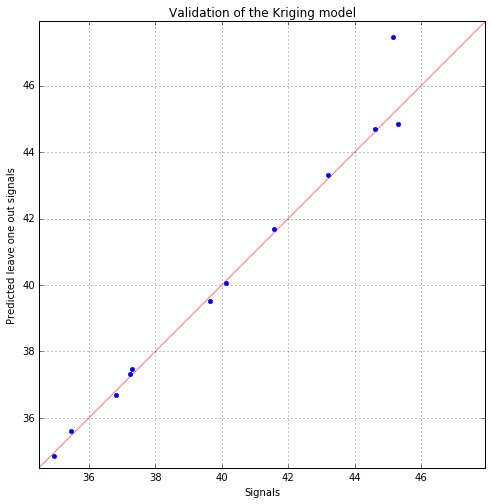Adaptive Signal POD using Kriging¶
# import relevant module
import openturns as ot
import otpod
# enable display figure in notebook
%matplotlib inline
import numpy as np
Generate data¶
inputSample = ot.NumericalSample(
[[4.59626812e+00, 7.46143339e-02, 1.02231538e+00, 8.60042277e+01],
[4.14315790e+00, 4.20801346e-02, 1.05874908e+00, 2.65757364e+01],
[4.76735111e+00, 3.72414824e-02, 1.05730385e+00, 5.76058433e+01],
[4.82811977e+00, 2.49997658e-02, 1.06954641e+00, 2.54461380e+01],
[4.48961094e+00, 3.74562922e-02, 1.04943946e+00, 6.19483646e+00],
[5.05605334e+00, 4.87599783e-02, 1.06520409e+00, 3.39024904e+00],
[5.69679328e+00, 7.74915877e-02, 1.04099514e+00, 6.50990466e+01],
[5.10193991e+00, 4.35520544e-02, 1.02502536e+00, 5.51492592e+01],
[4.04791970e+00, 2.38565932e-02, 1.01906882e+00, 2.07875350e+01],
[4.66238956e+00, 5.49901237e-02, 1.02427200e+00, 1.45661275e+01],
[4.86634219e+00, 6.04693570e-02, 1.08199374e+00, 1.05104730e+00],
[4.13519347e+00, 4.45225831e-02, 1.01900124e+00, 5.10117047e+01],
[4.92541940e+00, 7.87692335e-02, 9.91868726e-01, 8.32302238e+01],
[4.70722074e+00, 6.51799251e-02, 1.10608515e+00, 3.30181002e+01],
[4.29040932e+00, 1.75426222e-02, 9.75678838e-01, 2.28186756e+01],
[4.89291400e+00, 2.34997929e-02, 1.07669835e+00, 5.38926138e+01],
[4.44653744e+00, 7.63175936e-02, 1.06979154e+00, 5.19109415e+01],
[3.99977452e+00, 5.80430585e-02, 1.01850716e+00, 7.61988190e+01],
[3.95491570e+00, 1.09302814e-02, 1.03687664e+00, 6.09981789e+01],
[5.16424368e+00, 2.69026464e-02, 1.06673711e+00, 2.88708887e+01],
[5.30491620e+00, 4.53802273e-02, 1.06254792e+00, 3.03856837e+01],
[4.92809155e+00, 1.20616369e-02, 1.00700410e+00, 7.02512744e+00],
[4.68373805e+00, 6.26028935e-02, 1.05152117e+00, 4.81271603e+01],
[5.32381954e+00, 4.33013582e-02, 9.90522007e-01, 6.56015973e+01],
[4.35455857e+00, 1.23814619e-02, 1.01810539e+00, 1.10769534e+01]])
signals = ot.NumericalSample(
[[ 37.305445], [ 35.466919], [ 43.187991], [ 45.305165], [ 40.121222], [ 44.609524],
[ 45.14552 ], [ 44.80595 ], [ 35.414039], [ 39.851778], [ 42.046049], [ 34.73469 ],
[ 39.339349], [ 40.384559], [ 38.718623], [ 46.189709], [ 36.155737], [ 31.768369],
[ 35.384313], [ 47.914584], [ 46.758537], [ 46.564428], [ 39.698493], [ 45.636588],
[ 40.643948]])
# detection threshold
detection = 38
# Select point as initial DOE
inputDOE = inputSample[:7]
outputDOE = signals[:7]
# simulate the true physical model
basis = ot.ConstantBasisFactory(4).build()
covModel = ot.SquaredExponential([5.03148,13.9442,20,20], [15.1697])
krigingModel = ot.KrigingAlgorithm(inputSample, signals, basis, covModel)
krigingModel.run()
physicalModel = krigingModel.getResult().getMetaModel()
Create the Adaptive Signal POD with Kriging model¶
This method aims at improving the quality of the Kriging model where the accuracy of the computed POD is the lowest.
As this method is time consuming, it is more efficient to reduce the area of the defect size only in the most interesting part. To do that, an initial POD study can be run.
Run an initial POD study with the kriging technique¶
initialPOD = otpod.KrigingPOD(inputDOE, outputDOE, detection)
%time initialPOD.run()
Start optimizing covariance model parameters...
Kriging optimizer completed
kriging validation Q2 (>0.9): 0.8851
Computing POD per defect: [==================================================] 100.00% Done
CPU times: user 1min 19s, sys: 8.58 s, total: 1min 28s
Wall time: 1min 26s
fig, ax = initialPOD.drawPOD(0.9, 0.95)
fig.show()
/home/dumas/anaconda2/lib/python2.7/site-packages/matplotlib/figure.py:397: UserWarning: matplotlib is currently using a non-GUI backend, so cannot show the figure
"matplotlib is currently using a non-GUI backend, "
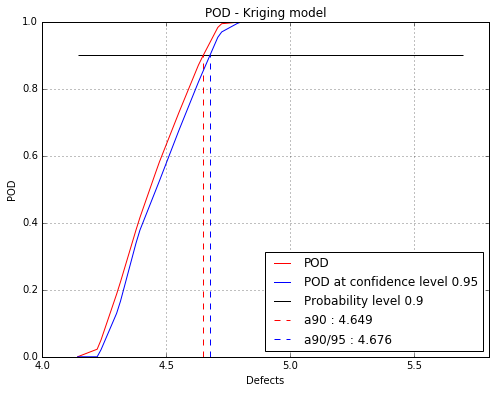
Based on this study, the interesting part for the defects ranges from 4.2 to 4.8. The adaptive signal algorithm will be then reduced to this area.
Run the adaptive algorithm¶
Computing the criterion is costly so the sampling and simulation size are reduced.
# set the number of iterations
nIteration = 5
# Creating the adaptivePOD object
adaptivePOD = otpod.AdaptiveSignalPOD(inputDOE, outputDOE, physicalModel, nIteration, detection)
# Change the range for the defect sizes between 4.2 and 4.8
adaptivePOD.setDefectSizes([4.2, 4.35, 4.5, 4.6, 4.7, 4.8])
# We can change also the number of candidate points for which the critertion is computed
adaptivePOD.setCandidateSize(100)
# we can change the sample size of the Monte Carlo simulation
adaptivePOD.setSamplingSize(500) # default is 5000
# we can also change the size of the simulation to compute the confidence interval
adaptivePOD.setSimulationSize(100) # default is 1000
# The current iteration POD graph can be displayed with multiple options :
## with or without the confidence level curve
## and with or without the intersection value at the given probability level
## if a directory is given, all graphs are saved as AdaptiveSignalPOD_i.png
adaptivePOD.setGraphActive(graphVerbose=True, probabilityLevel=0.9, confidenceLevel=0.95,
directory='figure/')
%time adaptivePOD.run()
Building the kriging model
Optimization of the covariance model parameters...
Kriging validation Q2 (>0.9): 0.8851
Iteration : 1/5
Computing criterion: [==================================================] 100.00% Done
Criterion value : 0.0284
Added point : [4.51406,0.0721604,1.06696,28.5617]
Update the kriging model
Kriging validation Q2 (>0.9): 0.9626
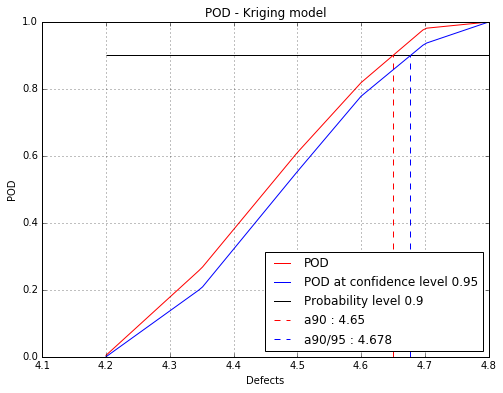
Iteration : 2/5
Computing criterion: [==================================================] 100.00% Done
Criterion value : 0.0229
Added point : [4.26562,0.0619081,1.03043,66.6416]
Update the kriging model
Kriging validation Q2 (>0.9): 0.9747
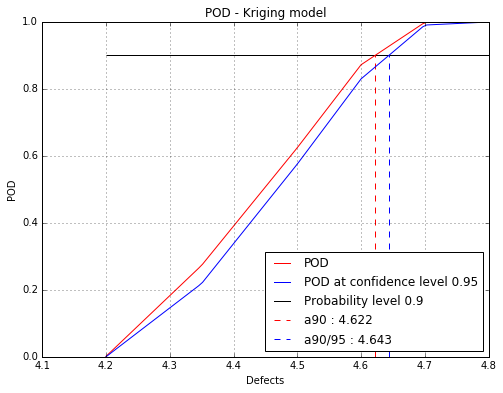
Iteration : 3/5
Computing criterion: [==================================================] 100.00% Done
Criterion value : 0.0216
Added point : [4.575,0.0315612,1.04003,34.3705]
Update the kriging model
Kriging validation Q2 (>0.9): 0.9789
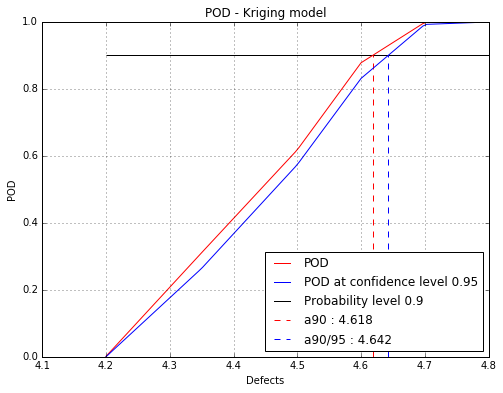
Iteration : 4/5
Computing criterion: [==================================================] 100.00% Done
Criterion value : 0.0205
Added point : [4.77187,0.0701099,1.04077,33.0796]
Update the kriging model
Kriging validation Q2 (>0.9): 0.9698
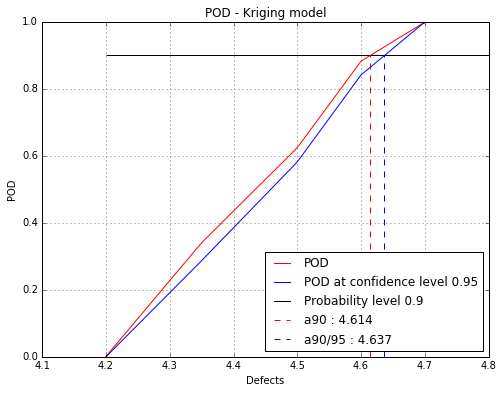
Iteration : 5/5
Computing criterion: [==================================================] 100.00% Done
Criterion value : 0.0190
Added point : [4.22813,0.0389429,1.0511,51.1515]
Update the kriging model
Kriging validation Q2 (>0.9): 0.9644
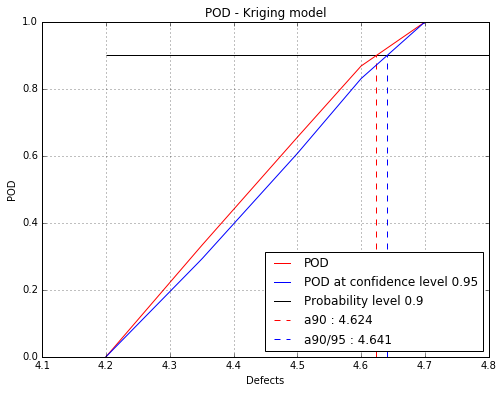
Start computing the POD with the last updated kriging model
Computing POD per defect: [==================================================] 100.00% Done
CPU times: user 8min 57s, sys: 1min 32s, total: 10min 29s
Wall time: 6min 14s
Display the POD result based on the adative kriging model¶
fig, ax = adaptivePOD.drawPOD(0.9, 0.95)
fig.show()
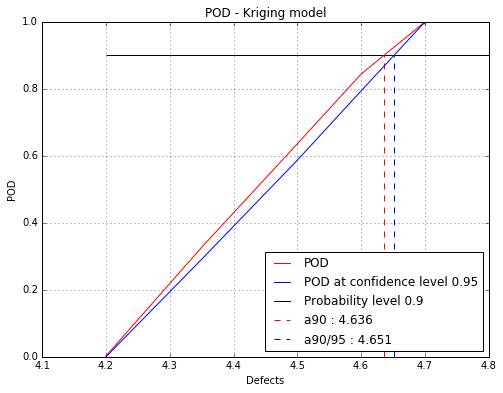
Quality improvement of the POD computation¶
From the adaptive algorithm, the kriging result and the final DOE are available. As the number of simulations were reduced, we can compute again the POD with more accuracy than before if needed.
# get the kriging result and the final DOE from the adaptive algorithm
krigingRes = adaptivePOD.getKrigingResult()
inputfinal = adaptivePOD.getInputDOE()
outputfinal = adaptivePOD.getOutputDOE()
defectSizes = adaptivePOD.getDefectSizes()
# A new POD study is launch with the DOE values
finalPOD = otpod.KrigingPOD(inputfinal, outputfinal, detection)
finalPOD.setDefectSizes(defectSizes)
# The kriging model is already known so it is given to this study
finalPOD.setKrigingResult(krigingRes)
finalPOD.run()
kriging validation Q2 (>0.9): 0.9644
Computing POD per defect: [==================================================] 100.00% Done
fig, ax = finalPOD.drawPOD(0.9, 0.95)
fig.show()
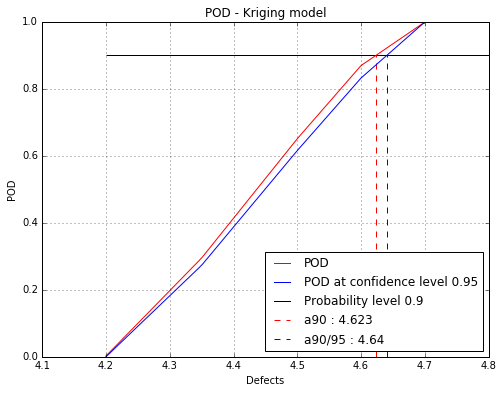
 otpod
otpod
